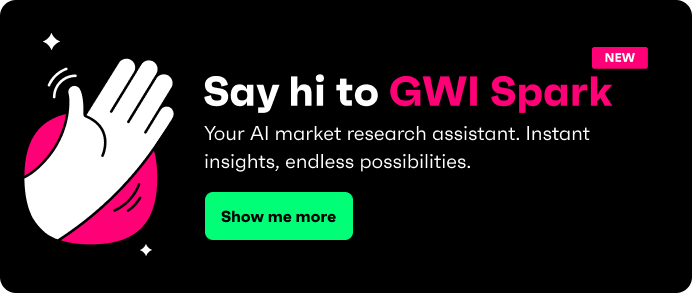
Gen Z and Gen Alpha are two of the most influential generations shaping our world today. Though close in age, the cultural, tech, and societal shifts they’ve grown up with make them surprisingly different. Understanding what sets them apart (and what brings them together) can help marketers, educators, and businesses create strategies that really resonate. So, ready to bridge the generational gap? Here’s what we’re going to cover:
- Who are Gen Z and Gen Alpha
- What are the key differences between Gen Z and Gen Alpha?
- What are some similarities between Gen Z and Gen Alpha?
- What this means for marketers
- Looking ahead: The future according to Gen Alpha
1. Who are Gen Z and Gen Alpha?
Gen Z, born between 1997 and 2012, is the first generation to grow up fully immersed in the digital age. From smartphones to social media platforms like Instagram and TikTok, technology has been a huge part of their daily lives.
This constant exposure has undoubtedly shaped their worldview and their characteristics, resulting in a generation that values authenticity, independence, and social impact. They’ve also lived through some major global events, like the Great Recession and widespread climate protests, which have made them more aware of big-picture issues and driven their desire for change.
In contrast, Gen Alpha, born from 2013 onwards, is the first generation to experience AI, smart devices, and gamified digital ecosystems from birth. They interact with technology in ways previous generations could never have imagined, such as using voice assistants like Alexa, engaging with augmented reality games, and learning through AI-driven platforms.
While Gen Z adapted to technology as it developed, Gen Alpha has known no other way of life. Their upbringing and unique characteristics set them up as a generation of trailblazers, ready to weave technology into every nook and cranny of our daily lives.
2. What are the key differences between Gen Z and Gen Alpha?
Tech habits
As we’ve just covered, Gen Z experienced the rise of the internet and social platforms during their formative years. They juggle smartphones and laptops for gaming, work, and chatting - blending mobility with functionality. When it comes to gaming, they’re all about smartphones first, then PCs and consoles, reflecting their practical and versatile use of technology.
Gen Alpha, on the other hand, is the first AI-native generation. As a result, their interaction with technology tends to be much more immersive and interactive. Tablets, smart devices, and gaming consoles are their go-to gadgets, which speaks volumes about their preference for intuitive, touch-based, and gamified experiences. Laptops and desktops? Not exactly their scene. Where Gen Z might still reach for a PC or laptop, Gen Alpha grabs what’s fast, fun, and portable.
Values and priorities
For Gen Z, social causes like mental health awareness, climate change, and inclusivity are a really big part of their identity. Because they place so much value on these causes, they expect brands to do the same. They want brands to put their money where their mouth is and prioritize meaningful change, not just slap on a rainbow logo in June with no initiatives to back it up.
But that being said, tighter wallets means that this generation can’t always back their values with their spending - especially when ethical choices come with a higher price tag. Economic pressures have clearly influenced their shopping habits, leading to a noticeable decline in their willingness to pay more for eco-friendly products.
Since 2021, the number of Gen Z who say they’d be happy to pay more for an eco-friendly product has been falling (dropped 9%).
As for Gen Alpha, their worldview is still taking shape. But early trends indicate a strong emphasis on fairness, inclusivity, and collaboration. Environmental awareness is still on the radar, but it doesn’t carry the same weight it once did for older generations. That could be because sustainability has become the norm; expected, not exceptional.
Media preferences
Social media hits differently for each generation. For Gen Z, it’s a stage - a space for self-expression and entertainment. TikTok, Instagram, and Snapchat are their holy trinity, and they gravitate toward short-form, visual content that resonates emotionally and authentically.
Gen Alpha’s social usage looks a bit different. They tend to post less about themselves and use social media the “old-fashioned” way - for staying in touch with people. In fact, 81% of 12–15-year-olds say they’ve chatted with friends online in the past week.
Considering their formative years have been shaped by hyper-connectivity, maybe it’s no surprise that they’re drawn to the parts of social media that help them stay in the loop with their loved ones.
Education and careers
Gen Z isn't waiting around for a syllabus to follow. They’re taking charge of their own education, using platforms like YouTube, Skillshare, and Coursera to learn at their own pace, on their own terms. They place a lot of value on flexibility and personalization, often choosing paths that align their passions and entrepreneurial dreams. And you can forget about climbing the corporate ladder - side hustles, freelancing, and purpose-driven work are taking priority.
There’s been a 34% drop in Gen Z job hunters saying opportunities for promotion matter to them since 2022.
While Gen Z are self-motivated to learn, Gen Alpha prefers educational content with a side of interactivity. For this generation, gamified, AI-powered platforms are far more appealing than traditional textbooks and classrooms. Adaptive learning platforms and interactive apps are a better fit for their always-on, highly visual world, while traditional education paths, like college and university, are starting to lose their shine. This trend is particularly prominent in regions like the US, where interest has dropped significantly.
What are some similarities between Gen Z and Gen Alpha?
Digital-first lives
If there’s one thing both generations have in common, it’s the amount of time they spend online. From chatting with friends to streaming content to learning new skills, digital platforms are firmly baked into their daily routines.
A need for authenticity
Neither Gen Z nor Gen Alpha has time for polished PR speak. They want the real deal - brands that walk the talk, own their values, and don’t shy away from tough conversations. Authenticity isn’t a bonus - it’s the baseline - and as a result, ads that feel too scripted or salesy will often fall flat. These generations prefer genuine connections and meaningful narratives.
Flexible career aspirations
Gen Z helped flip the script on the traditional 9-5, popularized the concept of side hustles by putting autonomy and passion ahead of the rigid career structures that have dominated for many of the previous generations. And Gen Alpha? They're already picking up the baton. Even at a young age, many are showing signs of following a similar path - one where fulfillment trumps formality, and career success is measured more by freedom than fancy titles.
A love for podcasts
Podcasts are hitting all the right notes with both generations. They’re easy to digest, available on demand, and packed with content that fits into busy, screen-saturated lives. For Gen Z, daily podcast listenership has grown by 14% since 2021, while Gen Alpha’s engagement with podcasts has increased by an impressive 29% over the same period. For brands, this is a wide-open lane: podcasts offer a chance to build real connection in a format that actually holds their attention.
What this means for marketers
If you want to reach Gen Z and Gen Alpha, it’s time to level up your playbook. For Gen Z, platforms like TikTok and Instagram are gold mines, offering valuable opportunities to connect through short-form video content and authentic messaging. Gen Alpha, though, plays a different game - literally. They need a more gamified approach, with interactive and immersive content standing out as key ways to capture their attention.
And across the board, simplicity wins. Clunky interfaces, slow load times, or anything that feels even slightly outdated is an instant turnoff. These generations were raised on sleek design and seamless UX - they expect frictionless everything. And here’s the non-negotiable: authenticity. Both Gen Z and Gen Alpha want brands to stand for something real and back it up with action, not just slogans. Be honest. Be relevant. Be useful. Do that, and you’re not just grabbing attention - you’re earning loyalty.
Looking ahead: The future according to Gen Alpha
As Gen Alpha grow up, their impact on tech, education, and shopping habits will only get stronger. They’ll crave AI-powered tools that make things more personalized and convenient, from shopping to learning and everything in between. Expect gamified, immersive learning to keep shaping their education, pushing schools to keep up and innovate.
When it comes to consumerism, Gen Alpha’s expectations for hyper-connectivity will likely redefine how products and services are created and delivered, and brands that can seamlessly blend physical and digital experiences will be well-positioned to capture their loyalty. By keeping an eye on Gen Z’s path, businesses can get ahead of Gen Alpha’s needs, strengthening their strategies for long-term success.
Final thoughts
Gen Z and Gen Alpha are shaping the future in unique yet interconnected ways. To truly connect with them, you need to understand what drives them, what they value, and what they expect. With GWI’s consumer insights, you’ll have everything you need to create strategies that don’t just keep up, but stay ahead.





.webp?width=495&height=317&name=pink_thumb_graphs%20(1).webp)
.webp?width=495&height=317&name=pink_thumb_letter%20(2).webp)